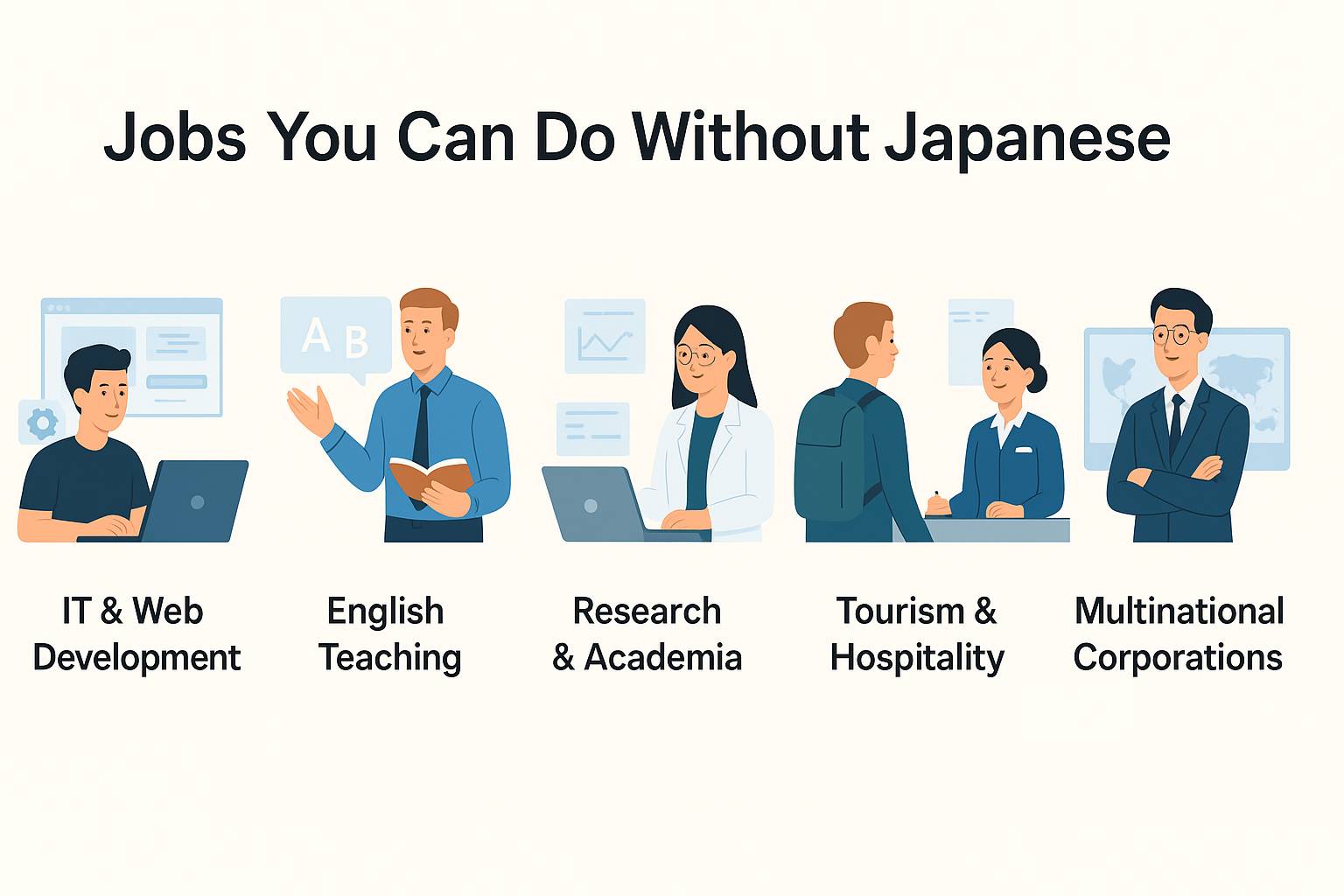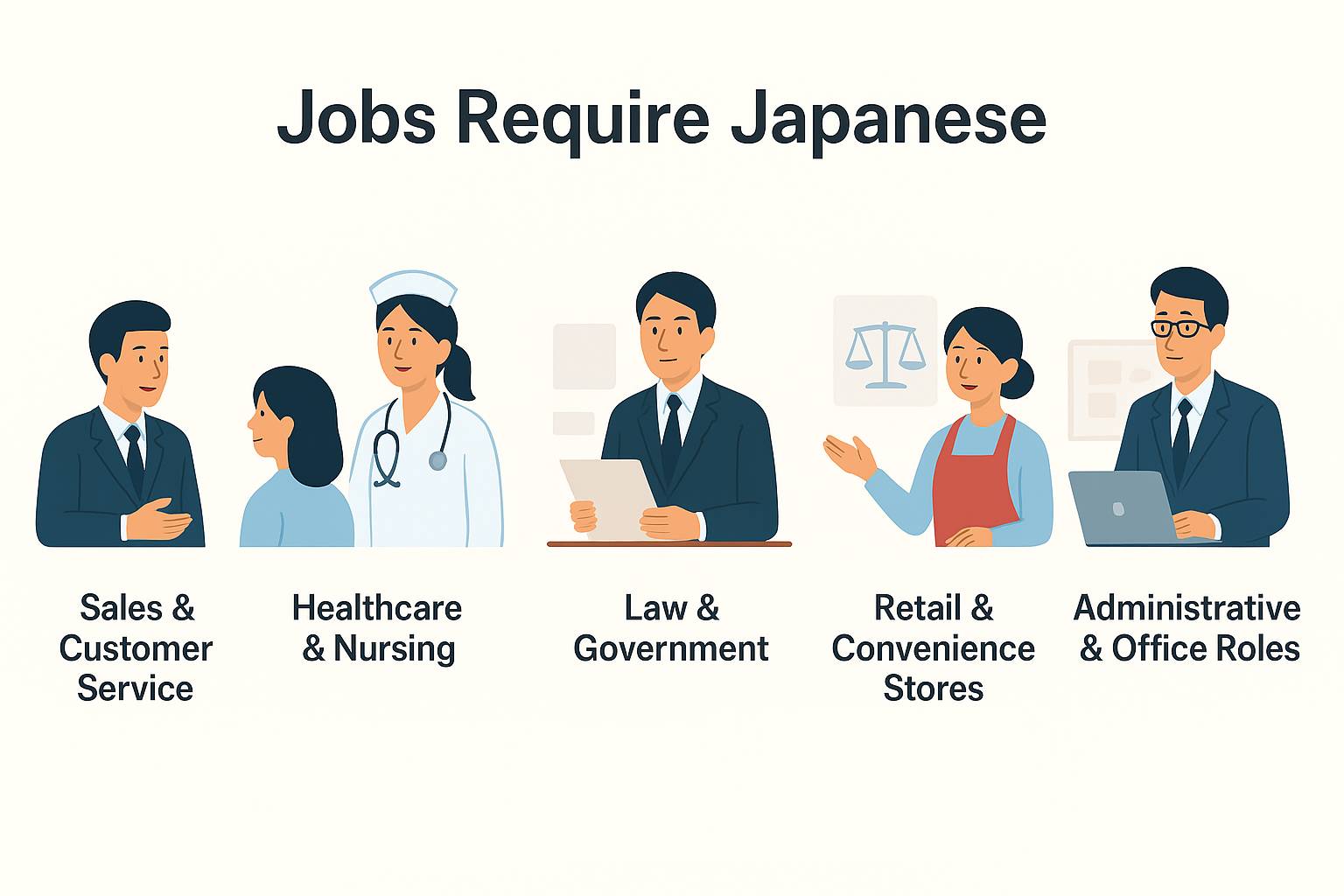Jobs in Japan Without Japanese: Everything You Need to Know
Please support us by sharing!

Can you really work in Japan without speaking Japanese? This is the question most foreigners—me included—ask first. When I first came to Japan, my Japanese was very limited, I had only studied about the first 10 chapters of Minna no Nihongo. Later, I completed a Master’s in Computer Science in English, and today I work as a web developer here. Some opportunities are open even with little Japanese, while others are not. In this post, I want to share what has worked for me, what hasn’t, and how you can think about your own next steps.
Is It Possible to Work in Japan Without Japanese?
Many foreigners, myself included, arrive in Japan with the same question: “Can I actually survive here without speaking Japanese?” The short answer is yes, but the reality depends on the type of job you aim for.
In fields like IT, global business, and academia, English is often the working language. For example, many international tech teams in Tokyo or Osaka conduct their meetings, documentation, and even daily communication in English, which means you can build a successful career without ever taking the JLPT.
This has been my own path: I came to Japan with a background in Computer Science and now work as a web developer. At present, I’m part of a fully Japanese engineering company, where my teammates understand only limited English. However, since we work in tech, most of the communication happens through the company’s internal software or Slack. Even when instructions are given in Japanese, the environment and platforms allow me to perform my work without any problem.

That said, work is only one part of life here. Outside the office, daily tasks such as visiting city hall, going to the bank, or explaining symptoms at a hospital will almost always be in Japanese. Even if your career is secure without the language, these everyday interactions can feel overwhelming. That’s why I always recommend learning at least basic conversational Japanese, not because it’s required for the job, but because it makes life in Japan much smoother and helps you connect better with the community.
For official guidance on visas, residency, and daily life, you can check resources like the
Immigration Services Agency of Japan,
CLAIR’s Multilingual Living Guide,
and JETRO’s work and living in Japan guide.
So yes, it is possible to live and work here without Japanese, but you’ll be limiting yourself to certain industries and companies. If your long-term plan is to grow in Japan, picking up the language—even slowly—will only open more doors for you.
Jobs You Can Do Without Japanese

IT & Web Development
Among all industries in Japan, IT is by far the most welcoming to foreigners with little or no Japanese ability. The demand for engineers is so high that many companies are forced to open their doors to international talent.
In my own case, I work as a web developer in Japan. Although my company is a fully Japanese workplace with mostly Japanese-speaking colleagues, the strong demand for tech engineers has led the office to build an environment where I can work smoothly without being held back by the language barrier. From the time I started until now, I have never faced any difficulties at work due to not being fluent in Japanese, which shows how much Japan values skilled engineers regardless of language.
Startups in Tokyo and Osaka, as well as global companies with offices in Fukuoka and Nagoya, often hire backend developers, frontend developers, DevOps engineers, and data specialists without requiring Japanese. What matters most is your portfolio, GitHub activity, and ability to communicate clearly in English. If you are good at solving problems and working in a team, IT is one of the easiest doors into Japan without JLPT certification.
English Teaching
Teaching English is still the number one entry point for many foreigners coming to Japan. Programs like JET, ALT positions in public schools, and private conversation schools (eikaiwa) recruit people from all over the world every year. For these roles, the requirement is not Japanese fluency but your ability to communicate and engage students in English.
Most contracts include visa sponsorship, which makes teaching a stable and secure option when you are new to the country. Of course, daily life outside the classroom is smoother with some Japanese, but inside the school your main focus is lesson planning, pronunciation correction, and classroom management—all in English. For people who don’t have a technical background, this is usually the easiest first step into working life in Japan.
Research & Academia
Japan’s universities and research institutes are very international, especially in fields like computer science, engineering, and biotechnology. Many labs publish in English and collaborate with overseas institutions, so English is often the working language. If you are pursuing postgraduate study or have research experience, you may find opportunities as a research assistant, teaching fellow, or postdoctoral scholar.
Day-to-day, communication with supervisors and fellow researchers is frequently in English, which means you can focus on your research output rather than struggling with language. This makes academia a natural career path for those with strong academic backgrounds but limited Japanese.
Multinational Corporations
Finally, there are multinational corporations (MNCs). Companies like Amazon Japan, Rakuten, Google, and many global consulting or finance firms often run entire departments in English. Here, your professional background and international experience matter much more than your Japanese. Teams in marketing, project management, IT infrastructure, and global finance operate across borders, so English is the common language.
These jobs are usually harder to land because of competition, but they offer some of the best career growth opportunities for foreigners in Japan who don’t speak Japanese. If you bring specialized skills and a strong CV, you may not need Japanese at all in this environment.
Tourism & Hospitality (International Segments)
Tourism is a mixed case. Many hospitality jobs do require Japanese because of constant interaction with locals, but there are exceptions. In major tourist areas—like Kyoto, Okinawa, or central Tokyo—hotels and travel companies sometimes hire foreigners specifically to handle English-speaking guests. Roles include front desk support, hotel guest services, English-speaking tour guides, and even content creation for tourism websites.
These jobs are often seasonal and can be competitive, but if you are good at customer service and understand international travelers’ needs, you can work in this field without advanced Japanese. International hotel chains, in particular, tend to value English fluency more than Japanese ability.
Jobs Require Japanese

Sales & Customer Service
When people think of working in Japan, sales or customer service often comes up first. But these roles are built entirely around communication and relationship-building in Japanese. Imagine trying to negotiate a contract, explain product features, or follow up with a client—every word and nuance matters. Japanese work culture often places strong importance on subtle points of language and manners. Without at least JLPT N2 or higher, it’s extremely difficult to succeed in these positions. That’s why most foreigners without Japanese skills are simply not considered for sales and customer service jobs.
Healthcare & Nursing
Healthcare is one of the strictest industries in Japan when it comes to language requirements. Doctors, nurses, and caregivers are expected to communicate with patients clearly, understand medical terminology, and interact with government agencies. Even if you already hold international qualifications, Japan requires you to pass medical exams in Japanese to practice. This means that near-native fluency is mandatory. For foreigners, this path usually becomes realistic only after years of both language study and cultural immersion. Without Japanese, working in healthcare here is almost impossible.
Law & Government
Legal and government jobs are another area where Japanese is absolutely essential. All documents, laws, and procedures are written in Japanese, and even minor mistakes can have serious consequences. To work as a lawyer, paralegal, or government official, you would need JLPT N1-level literacy and advanced fluency. This includes being able to draft contracts, attend official meetings, and handle bureaucratic filings—all in highly technical Japanese. Because of this, these fields are effectively closed to foreigners who don’t speak the language at a very advanced level.
Retail & Convenience Stores
Convenience stores and retail shops seem simple on the surface, but they require constant, fast-paced interaction with local customers. Workers must answer questions, handle transactions, and explain products—all in Japanese. Many international students try these jobs while studying, but even then, they usually need at least basic conversational Japanese to manage daily tasks. For someone with zero Japanese, retail can be very stressful, and mistakes can frustrate customers. That’s why it’s not the best fit unless you’re learning the language alongside working.
Administrative & Office Roles
Office work in a typical Japanese company involves emails, reports, meetings, and paperwork—all in Japanese. You’ll often be expected to prepare written documents for internal use or client communication. Without strong reading and writing skills, completing daily tasks becomes almost impossible. These roles usually expect JLPT N2 to N1 and a solid understanding of Japanese work culture. For foreigners, that often means years of study and prior experience before being trusted with these responsibilities. Unless you’re fluent, office admin jobs are not a realistic option.
Top Companies That Hire Foreigners
One of the most encouraging things I discovered after moving to Japan is that there are actually many companies that openly welcome foreign talent. These are not just tiny startups looking for cheap labor—some of the biggest names in tech, e-commerce, and consulting actively recruit international employees.
In the IT sector, global giants like Rakuten, Amazon Japan, and Google Japan use English internally and run diverse teams with members from all over the world. For developers, data scientists, and system engineers, these companies often care more about your skills and project experience than your Japanese level. Startups in Tokyo and Fukuoka are also hiring aggressively, building products with international markets in mind.
Outside of tech, industries such as finance, marketing, and consulting also offer roles where English is the primary working language. Many multinational corporations in Japan operate as regional hubs, which means their teams interact daily with colleagues in Singapore, the U.S., or Europe. In those environments, English is the common bridge language.
That being said, it’s always smart to do your homework before applying. Look at each company’s language policy, interview process, and visa support options. Some employers will sponsor work visas directly, while others expect you to already have one. Understanding this upfront can save you a lot of frustration.
I’ve put together a dedicated post with examples of the best employers for foreigners who don’t speak Japanese. If you’re curious about which companies to target first, check out my detailed guide here:
Top Companies Hiring Foreigners in Japan.
Changing visa status From Student to Worker
For many of us who first came to Japan as students, the big question is: what happens when school ends? Once your graduation date gets closer, you’ll need to shift from a student visa to a status that legally allows full-time work. This process is not automatic—your new visa must match the type of job you are offered. For example, an IT role usually falls under the “Engineer / Specialist in Humanities / International Services” category.
The transition is smoother if you start preparing early. Most schools recommend beginning the job-hunting process about a year before graduation. That gives you time to collect job offers, contracts, transcripts, and recommendation letters—all documents immigration may request. In my case, I had to provide not just my degree information but also details about my employer’s business to prove the role fit my background.
Another point many overlook: timing matters. If your student visa is expiring in March, but your company doesn’t onboard until April, you need to plan carefully. Immigration usually allows for this gap, but only if you’ve submitted all documents in advance and can show proof of employment.
Your employer will play a big role too. Companies familiar with hiring foreigners often guide you through the paperwork and even prepare letters explaining why you are a good fit. Smaller firms may leave most of the preparation to you—so always ask what level of support they provide before accepting an offer.
To help you navigate each step—forms, required documents, and realistic timelines—I’ve created a full guide that breaks it down in plain English. You can read it here:
How to Change Student Visa to Working Visa in Japan.
Succeeding in Japan Without Japanese: Real-World Tips
Building a career in Japan without Japanese is possible, but you’ll need more than just technical skills—you need visibility and community. Start by polishing your LinkedIn profile and making sure your portfolio or GitHub clearly showcases your work. Recruiters and HR managers in Japan often check these before they even look at your CV.
For job hunting, platforms like GaijinPot, Daijob, Jobs in Japan, and LinkedIn Jobs are the standard go-to options for foreigners. But in my experience, networking often opens more doors than online applications. Attending meetups, tech conferences, or even casual language exchange events can lead to unexpected opportunities and referrals into companies that rarely advertise publicly.

Even if your workplace is fully English-speaking, learning basic survival Japanese will make your daily life far easier—whether that’s setting up a phone contract, talking to your landlord, or navigating city hall paperwork. It also shows respect and effort, which Japanese employers notice. Over time, improving your Japanese can unlock new job options and help you move from “just getting by” to truly thriving here.
Other practical tips that helped me:
- Join online communities like Reddit’s r/movingtojapan, Japan Dev Slack groups, or Facebook expat groups—great for advice and hidden job leads.
- Practice interview etiquette (bowing, punctuality, polite phrasing). Even if the interview is in English, cultural fit is taken seriously.
- Show adaptability. Employers want to know you can handle Japan’s work culture—so share examples of past cross-cultural experiences in interviews.
- Don’t underestimate referrals. A friend’s introduction often carries more weight than 50 online applications.
Conclusion
When I first came to Japan without Japanese, I honestly wasn’t sure if I could find a proper job. But I was able to secure a position in IT at a fully Japanese company, even though English is not the main working language. Thanks to my technical skills, I’ve been able to work without any trouble, which has shown me that in Japan, strong expertise can open opportunities even if you don’t speak the language fluently.
If you’re looking, consider fields like tech, teaching, research, and multinational companies—they’re the most open to English speakers. On the other hand, customer-facing roles like sales, retail, or healthcare almost always demand strong Japanese, so plan for serious language study if those areas interest you.
The journey isn’t always smooth, but your skills do matter, and there are teams in Japan that need them. With the right mix of persistence, networking, and gradual language learning, you can find your own way here too.
